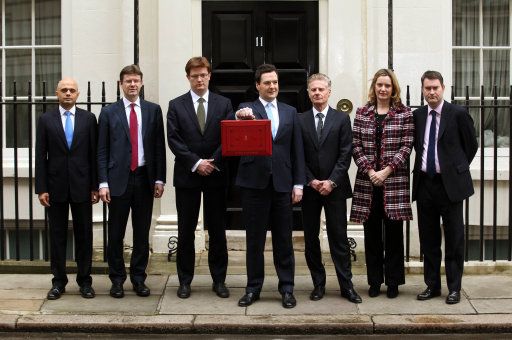Was Mr Osborne's latest Budget simply putting off the inevitable?

The day following Chancellor George Osborne's 2013 Budget speech, Steve Hawkes, Business Editor of the Sun newspaper, ended his brief analysis on the Budget with these words:
"But yesterday, he (Mr Osborne) confirmed our debts will be far higher for far longer.
"Yet any meaningful reform of the public sector still remains a pipe dream.
"And in spending yet another Budget Day treading water, Mr Osborne is showing that to the Government, votes matter more than the serious economic restructuring we need."
Despite this barb and a front page which pretended to be censorious of the Chancellor's efforts, I couldn't help but get the impression that the newspaper broadly approved the "give-aways" that fell from 11 Downing Street's table whilst highlighting the awkward fact that the country's economy is nowhere near where it was expected to be when the Coalition came to power in 2010 and that there is still an enormous mountain to climb.
Saving the Chancellor's blushes for cosmetically reducing the year on year Deficit by a paltry £100 million, was the fact that the media noted that the Opposition, though critical, had failed to produce any viable alternative and were left emphasising things like the "tax give-away" to millionaires, this being from a previous Budget statement. (The number of people who actually earn £1 million or more in the UK is about 6,400).
Many might think that I would be better to quote the Business Editor of the Financial Times but the simple fact is, not too many people read that fine broadsheet and Mr Hawkes's points are valid and cannot be ignored.
Taking the public sector issue first, "reform" invariably means job losses and they have been significant with over 270,000 lost in 2011 alone and compulsory redundancies since then in the likes of the Armed Forces - "Our Boys" in Sun parlance. Changing the country's employment structure is happening but this is likely to take several years more and if achieved too suddenly would cause unnecessary hardship in areas where the public sector makes up over 30 per cent of the workforce.
Likewise the "serious economic restructuring" though necessary, with the likes of manufacturing down to some 11 per cent of our economy, is no short-term fix but there is undoubtedly a real worry for the Chancellor with the deficit at £120 billion last year and remaining the same this - less that £100 million, and according to the Office of Budget Responsibility, likely to remain at the same level next year too. That might well put pressure on the Pound and downgrade our international credit rating.
With hindsight, it is easy to suggest that when the Coalition came to power that they should have thrown their hands in the air on seeing the books and gone back on their manifesto pledges. The National Debt which had fallen to £386 billion at the end of 2001 was being criticised by many Labour supporters as the Government not fulfilling promises on increased spending on Health, Education and Welfare. Gordon Brown obliged, increasing spending in these areas but without raising Government revenues (taxes) or decreasing spending in other departments.
At the end of 2007 the National Debt had risen to £619 billion, a year later to £750 billion and by the time of the 2010 Election was increasing by £3.13 billion a week. Currently it's £1.15 trillion and although the annual Deficit has been reduced by over a quarter, it was the "easy" quarter that was reduced and Mr Hawkes is not the only one to imply that the Government does not have the bottle to attack Britain's huge £190 billion Welfare Budget with all these nice things like Child Care Allowance.
Considering the Chancellor is in something of a bind, it is generally conceded that he produced as fair a Budget as possible with increases in the amount one can earn before paying tax increasing to £10,000, "Help-to-Buy" measures for the housing sector and rescinding the increase in fuel duty. There will also be help with childcare costs and that penny reduction in the duty on beer. Given Mr Osborne's constraints, could he have done more?
Without increasing borrowing, I would have forgiven him for making such things as free bus passes, no or reduced prescription charges, TV licenses, Winter Fuel Payments and the likes means tested. True it would mean going back on an Election promise and yes, withdrawing these benefits from those like myself who are not in need of such, would only save a couple of billions.
Small beer but better to go to the genuinely disadvantaged.











